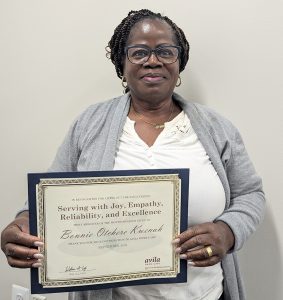The Serious Risk of Pneumonia for Seniors
While pneumonia can be a dangerous disease for anyone to develop, it is particularly concerning for senior citizens, in which pneumonia may prove fatal. Seniors can help lessen their risk of pneumonia in several ways. Here, the elder care providers at Avila Home Care provide an overview of pneumonia, detail the risks and explain how seniors can prevent themselves from developing this disease.
What is Pneumonia?
Pneumonia is an infection that causes the air sacs to inflame in either one or both lungs. Inflamed air sacs fill with purulent material, such as fluid or pus, which causes coughing and difficulty breathing. Fever, chills, chest pain and fatigue are often common among those with pneumonia, and symptoms can last for several weeks.
How Does Pneumonia Spread?
Pneumonia can be caused by a variety of organisms, including bacteria, fungi or viruses. Pneumonia is categorized by what type of organism causes it. These categories are as follows:
Community-Acquired Pneumonia
The most common type of pneumonia, it is contracted outside of a hospital or health care setting and can be caused by bacteria, fungi or virus. Streptococcus pneumoniae is the most common form of bacterial pneumonia in the United States and may occur after an individual has experienced a cold or the flu. This type of pneumonia may also only affect one lobe of the lung, a condition known as lobar pneumonia.
Hospital-Acquired Pneumonia
This type of pneumonia is also caused by bacteria and is contracted by those living in long-term care facilities or receiving care in outpatient facilities. Often, the bacteria that cause hospital-acquired pneumonia are more resistant to antibiotics, so this type of pneumonia is typically more difficult to treat.
Aspiration Pneumonia
Aspiration pneumonia is caused by food, drink, vomit or saliva being inhaled into the lungs. This type of pneumonia is more common in individuals who have an impaired coughing ability, such as those with neurological disorders, Parkinson’s, throat cancer, a weakened immune system and other conditions.
Why are Seniors More Susceptible to Serious Cases of Pneumonia?
Seniors over 65, along with children under the age of two, are considered at high risk for developing pneumonia. This is because seniors are more likely to have a compromised immune system; chronic diseases, such as heart disease or chronic obstructive pulmonary disease and are more likely to be smokers. When seniors develop pneumonia, it may also be more difficult to treat them due to other prescription medications they take and stomach sensitivity to medication. Seniors also have a lesser lung capacity than younger people, meaning it is more difficult for them to expel fluid from their lungs through coughing.
What are Some Additional Pneumonia-Related Complications Seniors May Face?
Because seniors are at high risk for pneumonia, they are also at risk for pneumonia-related complications, including:
- bacteremia, or bacteria in the bloodstream,
- difficulty breathing,
- pleural effusion, or fluid accumulation around the lungs, and
- lung abscesses.
Unfortunately, complications can occur at any time during the course of pneumonia, even during treatment, so seniors who have or believe they have developed pneumonia should see a medical professional right away.
How Can Seniors Help Prevent the Contraction of Pneumonia?
While it is impossible to fully prevent the development of pneumonia, there are ways for seniors to lessen their chances. Vaccines are available to protect against pneumonia and the flu, and seniors should inquire with their medical care provider about having these vaccines administered. Seniors should also practice good hygiene and wash their hands regularly, for a minimum of 20 seconds, with hot water and soap. Those who smoke should talk to their doctor about methods to quit, as smoking comprises the health of the lungs and can increase a senior’s chances of developing pneumonia.
The senior care providers at Avila Home Care are dedicated to helping the elderly make healthy choices. There are many reasons a senior may benefit from a care provider, including benefitting their physical health, and seniors are encouraged to learn more about how a care provider may improve the quality of their aging-in-place experience. To learn more about Avila Home Care, contact us today!
How to Budget While Aging in Place
Aging in place is typically less expensive than nursing or retirement homes, but it is still important to make wise financial choices. Here, the experts at Avila Home Care share tips on how to budget while aging in place. Create an Income You Can Live On One of the most important steps in creating a…
Read More...Bonnie Otchere Kwenah is Avila’s Caregiver of the Month for September, 2024!
Congratulations to Avila’s Caregiver of the Month for September 2024- Bonnie Otchere Kwenah! Bonnie has served Avila’s clients for 6 years, providing exceptional care with wonderful kindness. Read what our clients’ daughter had to say about Bonnie who cared for her parents for 3 1/2 years- “I had the blessing of having my parents live…
Read More...How Aging in Place is Benefited by a Professional Caregiver
Some seniors have unique needs and concerns, which can make aging in place seem daunting. A professional caregiver can mitigate many, if not most, of these concerns. Here, the homecare professionals at Avila explain why investing in a professional caregiver can be worth the expense, and provide the peace of mind you deserve while aging…
Read More...

